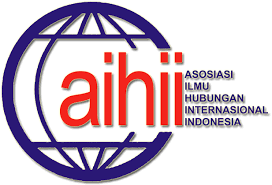Nilai Toleransi pada Bingkai Kebijakan Dalam dan Luar Negeri UAE
Abstrak
Starting at the end of the 20th century, the United Arab Emirates (UAE) began to focus its policies on forming a national identity because the migrant population dominated the local population. To overcome this phenomenon, increase investment and economic growth, and maintain domestic harmonization, the UAE government is trying to shape a national identity and implement the value of tolerance in its domestic and foreign policies. This article will describe how the UAE uses tolerance to form a national identity in its domestic and foreign policies and how the Islamic religion plays a role. This research uses qualitative methods and the concept of constructivism in foreign policy. The study finds that the UAE has implemented several approaches to create a national identity full of tolerance to achieve its national interests, namely investment, economic growth, the tourism industry and regional security.
##plugins.generic.usageStats.downloads##
Referensi
Alhashmi, M., Bakali, N., & Baroud, R. (2020). Tolerance in UEA Islamic Education Textbooks. Religions, [online] 11(8), 377. https://doi.org/10.3390/rel11080377 [Diakses 10 Juli 2023]
Aljazeera. (2020). How the world reacted to UEA, Israel normalising diplomatic ties. [online] Dalam: https://www.aljazeera.com/news/2020/8/15/how-the-world-reacted-to-uae-israel-normalising-diplomatic-ties [Diakses 20 Juni 2023]
Baycar, H. (2022). Promoting multiculturalism and tolerance: Expanding the meaning of “unity through diversity” in the United Arab Emirates. Digest of middle East Studies, [online] 32(1), 40-59. Dalam: https://doi.org/10.1111/dome.12282 [Diakses 20 Juni 2023]
Biersteker, T. J. (2007). International Law and International relations. New York: Routledge.
Billah, B. G., Hakim, M. J., & Bahruddin, U. (2023). Normalisasi Hubungan Uni Emirat Arab-Israel dan Dampaknya Terhadap Palestina. Jurnal ICMES, [online] 7(1), 62-81. https://doi.org/10.35748/jurnalicmes.v7i1.147 [Diakses 18 Juni 2023]
Cafiero, G. & Alexander, K. (2019). The notion of tolerance in Emirati foreign policy. [online] Gulf State Analytic. Dalam. https://gulfstateanalytics.com/the-notion-of-tolerance-in-emirati-foreign-policy/ [Diakses 10 Juni 2023]
El Sawy, N. (2008). Foreign influences: Expats force locals to ask who they are. [online] Financial Times. Dalam: https://www.ft.com/content/e9f2b246-2161-11dd-a0e6-000077b07658. [Diakses 19 Juni 2023]
Erbas, Isa. (2022). Constructivist Approach in Foreign Policy and in International Relations. Journal of Positive School Psychology, [online] 6(3), 5087–5096. Dalam: https://journalppw.com/index.php/jpsp/article/view/2720/1746 [Diakses 15 Mei 2023]
Fattah, H. M. (2006). Dubai debates the limits of multiculturalism—Africa & Middle East International Herald Tribune. New York Times, [online] Dalam: https://www.nytimes.com/2006/10/19/world/africa/ 19iht-dubai.3214583.html [Diakses 20 Mei 2023]
Globalmediainsight.com. (2023). United Arab Emirates Population Statistic 2023. [online] Dalam: https://www.globalmediainsight.com/blog/uae-population-statistics/#history [Diakses 15 Mei 2023]
Iqtidar, H. (2016). Introduction: Tolerance in Modern Islamic Thought. ReOrient, [online] 2(1), 5-11. Dalam: https://doi.org/10.13169/reorient.2.1.0005 [Diakses 20 April 2023]
Medon, M. O. M., & Aneba, A. M. (2013). Role Of Islam And Its Tolerance In Constraining Terror. Ulul Albab: Jurnal Studi Islam, [online] 13(2), 113-122. https://doi.org/10.18860/ua.v0i0.2370 [Diakses 17 April 2023]
Moleong, L.J. (2018). Metode Penelitian Kualitatif. Bandung: PT Remaja Rosdakarya.
Nassar, T. (2019). Israel to take part in Dubai’s Expo 2020. [online] The Electronic Intifada. Dalam: https://electronicintifada.net/blogs/tamara-nassar/israel-take-part-dubais-expo-2020. [Diakses 20 April 2023]
Otoiba, Y. A. (2019). Why We Invited the Pope to the Arabian Peninsula. Politico Magazine, [online] Dalam: https://www.politico.com/magazine/story/2019/02/02/pope-francis-visits-arabian-peninsula-224545/. [Diakses 10 Mei 2023]
Sabban, R. (2018). State Building, State Branding and Heritage in the UEA. [online] LSE Middle East Center Blog. Dalam: https://blogs.lse.ac.uk/mec/2018/12/17/state-building-state-branding-and-heritage-in-the-uae/. [Diakses 16 April 2023]
Sircar, N. (2020). Israelis in the UEA laud the culture of tolerance. Khaleej Times, [online] Dalam: https://www.khaleejtimes.com/news/general/Israelis-in-the-UAE-laud-the-culture-of-tolerance-- [Diakses 19 Juni 2023]
Slackman, M. (2008). Emirates See Fiscal Crisis as Chance to Save Culture. The New York Times, [online] Dalam: https://www.nytimes.com/2008/11/12/world/middleeast/12dubai.html. [Diakses 12 April 2023]
Watanabe, A. (2019). The complexities of social inclusion and exclusion among intermarried filipino migrant workers in the United Arab Emirates. International Labour Migration in the Middle East and Asia, [online] 8, 55-73. Dalam: https://link.springer.com/chapter/10.1007/978-981-13-6899-8_4 [Diakses 10 April 2023]
Writer, S. (2018). Why the UEA is turning to expats to boost growth. Arabian News, [online] Dalam: https://www.arabianbusiness.com/politics-economics/397098-why-the-uae-is-turning-to-expats-to-boost-growth. [Diakses 17 Mei 2023]







